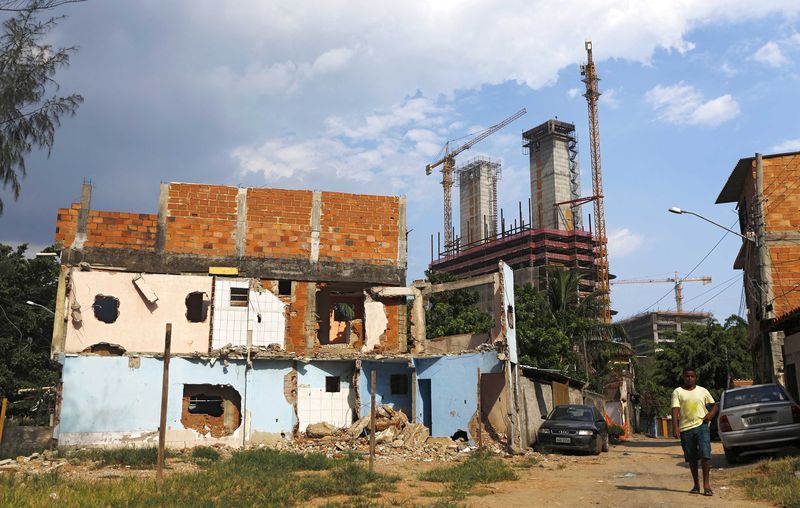By Stephen Eisenhammer
RIO DE JANEIRO (Reuters) - Street addresses jump in the Vila Autodromo favela: 39, 42, 48, 51.
The missing numbers belonged to homes now reduced to rubble to make way for the Olympic Park in Rio de Janeiro. But 18 months before the Olympic Games begin, about 50 families still refuse to leave, clinging on despite increasing isolation and irregular access to basic services like water and electricity.
The land conflict in Vila Autodromo, which feels like a ghost town with 90 percent of its residents gone, shows the underside of Rio's attempt to use the 2016 Olympic Games to modernize the city.
Vila Autodromo holdouts have become a symbol of resistance to those transformation plans and, depending on how authorities deal with their refusal to leave, a potential flashpoint for anti-Olympics sentiment and protests ahead of the Games.
In a country with fierce inequality, many are frustrated the government is spending money on another international sporting event just two years after hosting the soccer World Cup.
The run-up to the World Cup last year was marked by the largest street protests in decades as Brazilians protested the billions spent to host the event. While few are predicting similar demonstrations against the Olympics, social discontent is bubbling just below the surface.
"Para Quem? - or "For Whom?" - has become the rallying cry for a small but hardened group of activists who say hosting the Olympics only benefits the rich, particularly real estate speculators. The level of opposition is likely to grow as Brazil's economy stalls on the approach to the Games.
Located off a main avenue in Rio's prosperous beachside suburb of Barra de Tijuca, Vila Autodromo is a small strip of houses and unpaved roads by a lagoon. The buildings vary from ramshackle cinder block homes typical of squatter settlements, or favelas, to well-built spacious houses by the water.
The 450 families that have already been moved from the favela are just a small part of the more than 20,000 families that have been re-located since 2009 in the state of Rio de Janeiro alone, many of them to make way for Olympic projects.
"If they demolish everything and I am the only one left, I'll still stay," said Marcia Lemos, 57, who lives in the shadow of the cranes building the main Olympic site where over a dozen sports from cycling to swimming will be held.
Lemos, who has lived in Vila Autodromo for 12 years with her husband and three sons, has gradually seen her neighbors leave, either moving to a government-provided apartment in a nearby housing project or accepting money for their property.
"The day after you leave, or sometimes even the same day, the government sends someone to destroy the house," Lemos said.
Rio's City Hall says the clearing of the community is needed for roads to access the Olympic Park, but residents believe the area will be used to build luxury apartments or hotels once the Games are over.
Plans already exist to transform much of the Olympic Park into high-rise apartments, and the Olympic Village, which is under construction nearby and will house visiting athletes, will also later be sold as residences.
Human rights group Amnesty International says the government has yet to produce convincing evidence that the community, which has property rights over the land, really needs to be moved.
TAPS RUN DRY
The destruction has left some residents without water, including Tadeu Peixoto, 52, whose taps ran dry for 60 days until he improvised a connection to his departed neighbor's water system.
"Every day I'm more isolated," Peixoto said, standing in the front yard of his home, which is connected to a semi-demolished house. "I want to stay or be paid enough to move out of Rio. If I have to move I don't want to stay in this city."
Vila Autodromo has attracted the attention of activists and academics who say its level of resilience is rare in Brazil.
Erick Omena, a researcher at the Federal University of Rio de Janeiro, says the case is unique for the way some residents have leveraged the legal ambiguity - which usually plays into the hands of authorities - to fight for better terms.
Some residents, emboldened by the support of activists and lawyers, have managed to get good money for their homes, with one reportedly receiving 2.7 million reais ($1.1 million).
"This kind of power from a local poor community, in which some are saying how much money they want in order to leave, is very unusual," Omena said.
For developers scrambling to get venues ready in time for the Olympics, Vila Autodromo is a headache.
Critics say the destruction has already gone too far. Giselle Tanaka, who is writing her doctoral thesis on the evictions, points to original designs for the Olympic Park that are still visible on Rio 2016's website and include Vila Autodromo - albeit slightly reduced in size.
Yet over the last few years it became increasingly evident the authorities wanted the whole area cleared.
"They have gone from periods of bullying the community, to trying to negotiate, and back to bullying," Tanaka said.
In a written response to questions, Rio's Secretariat for Housing said it "vehemently rejects any accusations of violence or disrespect towards the families of Vila Autodromo," adding that negotiations were conducted in a transparent manner.
Those that fight on in Vila Autodromo know they are taking a gamble. Resident Marcia Lemos says she is holding out for 5 million reais for her three bedroom house that overlooks a lake.

But she admits: "There is a risk I'll lose everything."